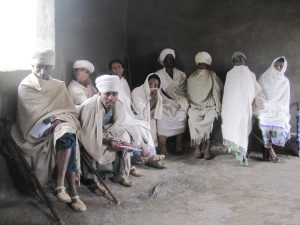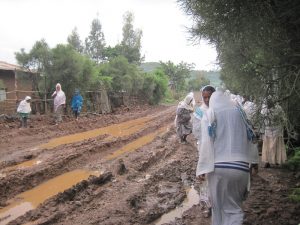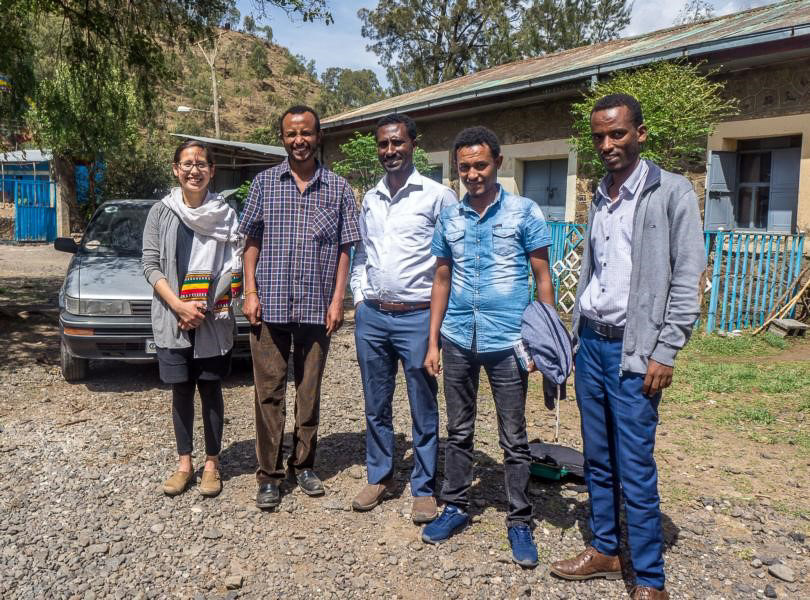Rebekah Maldonado-Nofziger ‘12, a Doctor of Nursing Practice candidate at the University of Washington, is serving for nine months in Ethiopia as a fellow with Strengthening Care Opportunities through Partnership in Ethiopia (SCOPE). In Gondar, she is partnering with health workers and faith leaders to improve maternal and newborn mortality rates.
She will stay to complete her practicum and capstone next year at the University of Gondar, graduating in March.
SCOPE was founded in 2009 “to empower religious leaders to be health advocates in their communities” through education and addressing social and cultural barriers to healthcare. Currently focused on HIV/AIDS and maternal and newborn health, SCOPE programs link to “local and sustainable health systems.” They are supported by graduate student fellows from the University of Washington and the University of Gondar, its website states.
Maldonado-Nofziger is working with a specific intervention called Faith Leaders Advocating for Maternal Empowerment (FLAME). It pairs Ethiopian Orthodox priests with community health workers to decrease the high mortality rate of women and their newborns by encouraging antenatal, delivery and postpartum care.
Improving health disparities

In Ethiopia – where 3.2 million babies were born in 2015, UNICEF reported – the statistics are dire.
The country’s neonatal mortality rate is nearly three percent, seven times higher than in the United States.
Only 32 percent of women in Ethiopia receive at least four antenatal care visits (that number is 97 percent in the U.S.).
And in 2014, just 13 percent of Ethiopian women aged 15-49 received postnatal care within two days of giving birth, according to UNICEF.
In her role with FLAME, Maldonado-Nofziger updated a training manual and developed standard procedures for guiding the five-day trainings and subsequent interventions. Now, as part of a team, she is visiting six intervention health center sites to provide follow-up discussions for priests and health workers. The meetings focus on building knowledge of maternal and child health and addressing barriers to reaching pregnant women in their communities.
The team will also collect data at these and 12 other health centers to assess the efficacy of the interventions.
Maldonado-Nofziger said that EMU gave her a framework for “using social justice to guide the work that I do,” and, along with the Mennonite church, has helped her “question structures of injustice and find ways to partner with communities to change systems of oppression,” she said.
“Public health nursing and Mennonites go together,” she said. “We need more of them!”
A meaningful experience

Maldonado-Nofziger’s experience has not been without logistical challenge; she at times lacks access to water, electricity and phone and internet service, which she needs to complete coursework for her population health practicum.
“It is a reminder that global health does not take you to places necessarily of monetary wealth or resources,” she said. “My colleagues and friends in Gondar have taught me the importance of simplicity and happiness even when resources are lacking.”
Indeed, while the work is important, she is learning that “it is also important to spend time with people.” In a SCOPE blog post, she described a restaurant she frequents, where she has become friends with staff.
“We are often laughing at each other because we are both trying to have thoughtful conversations,” she wrote, “but as you can imagine, this is challenging without a common language. Together we learn.”
One day the restaurateurs treated her to doro wat, a national spicy chicken stew. That same day, other friends she has met at a university library talked her into putting cornrow braids – shorba – in her hair, after which some “told me I had turned Ethiopian,” she wrote.
Maldonado-Nofziger also took part in an emotional celebration when an Ethiopian SCOPE colleague who had been held for almost two years as a political prisoner was released. He was paraded through the city, with people coming out of their homes and cheering, and then spoke “a message of peace, love and unification between all the regions in Ethiopia,” she said.

Thank you for sharing this! Having worked in MCH Public Health Nursing in Ethiopia for many years in the 70’s and 80’s, I am so grateful to read this article! It sounds so familiar, both the delightful parts and the more challenging parts! I am grateful that Rebekah Maldonado-Nofziger is continuing this important work! Would love to learn more about your story, Rebekah! Blessings, courage, and joy to you!